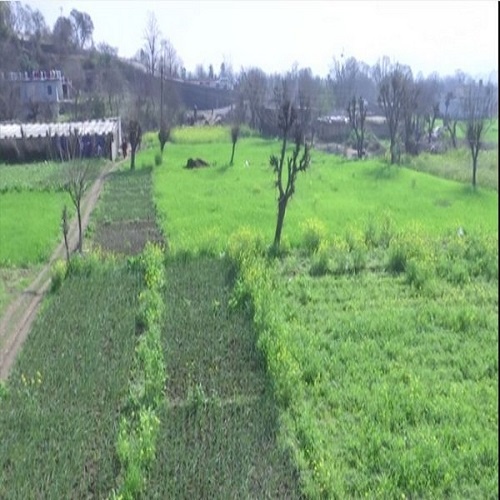Jammu and Kashmir [India], May 30(India): Holistic Agriculture Development Programme (HADP) has proven to be a boon for small and marginalized farmers in Jammu and Kashmir. It is helping them to script a new chapter in the agriculture economy of the Himalayan region.
The conceptualization and formulation of the massive transformative HADP mission to reform agriculture and allied sectors in J-K have made farmers self-reliant and capable.
Pertinently, in 2022 the J-K Government constituted the Apex Committee headed by former Director General, Indian Council of Agricultural Research (ICAR), Mangala Rai to come up with suggestions to help farmers in the Union Territory to prosper.
In October 2022, the committee presented the ideas for holistic development of agriculture and allied sectors in J-K and transformative change in farmers’ income.
The recommendations of the panel were aimed at securing the livelihood of 13 lakh farm families with particular emphasis on increasing farmers’ income and generation of additional employment opportunities.
The committee had done the SWOT (Strengths, Weaknesses, Opportunities and Threats) analysis of the agriculture and allied sectors of the Himalayan region and covered various important aspects before finalizing the recommendations.
Suggestions of the panel were implemented to transform J-K’s agriculture sector into a sustainable commercial agri-economy.
Twenty-nine projects worth Rs 5,013 crore under HADP were identified to push the agriculture and allied sectors to a new trajectory of growth with economy, ecology and equity as its guiding pillars.
Besides implementing the recommendations of the panel led by Dr Mangal Rai, the government strengthened e-NAM trade (National Agriculture Market is a pan-India electronic trading portal which networks the existing APMC mandis to create a unified national market for agricultural commodities) which led to J-K achieving a pivotal position in the country.
Processing of the products was enhanced to garner better returns. Buyers showing keen interest in the unique and high-quality products of the Union Territory provided an added advantage to the sellers.
Financial, other schemes
Agriculture credit schemes of banking and other institutions to provide seamless credit to the farmers for the effective implementation of HADP helped them to overcome financial issues.
As of date farmers are being provided with 100% saturation of benefits under the Kisan Credit Card and other Central and UT schemes of agriculture and allied sectors.
Banks have been directed to dispose of the cases received under HADP within a short span of time. Cases of small and marginal farmers are being taken up as a top priority.
The government has embarked on the mission to enhance farmers’ competitiveness and increase their advantage in emerging market opportunities.
Farmer Producer Organizations (FPOs) have transformed into engines of growth and have emerged as major players in transforming agriculture into a vibrant part of J-K’s growing economy.
The FPO’s major operations include the supply of seed, fertilizer and machinery, market linkages, training, networking and providing financial and technical advice to the farmers.
Small Farmers Agribusiness Consortium (SFAC) has emerged as the lead agency for implementing eNAM under the aegis of the Union Ministry of Agriculture and Farmers’ Welfare.
Million J-K farmers receive direct financial support.
According to the officials, during the past three years, more than a million farmers in J&K have received direct financial support of Rs. 1983.29 crore under the PM Kisan scheme. Besides, 12 lakh farmers have been issued Kisan Credit Cards (KCC), out of this, 9.46 lakh KCC are live/operative in the UT. Their number is swelling with each passing day.
The J-K government is providing 50 per cent capital support up to Rs. 22.15 lakh per hectare under High-Density Plantation Scheme (HDPS). The inclusion of HDPS under the Agriculture Infrastructure Fund Scheme has made available the credit on interest subvention of 3% per annum for 7 years.
The credit guarantee coverage made available under the credit guarantee fund trust offers loans up to Rs 2 crore for micro and small enterprise schemes. Besides, the promotion of ‘vocal for local’ has opened up a plethora of opportunities for the farmers.
National and international players are taking a keen interest in J-K products as the market linkages have increased due to farmer-oriented steps taken by the government.
The incomes of farmers are increasing substantially. Youngsters who had given up the profession of their ancestors have returned to the fields.
The government has devised a clear-cut policy to secure a comprehensive transformation in the livelihood of farmers in J-K. The technological interventions and diversifying support systems in the agriculture and allied sectors have turned farming into an entirely new field.
The Agriculture Production Department has been restructured with an aim to double the income of farmers, orchardists and people dependent on animal, and sheep husbandry and fisheries for their livelihood.
The restructuring of the key department has brought all the welfare schemes for the farmers under one roof. Farmers no longer have to run from one place to another to get loans and subsidies. The single window system has made things easier for them.
Latest innovations are helping farmers to predict the weather and assess crop and soil health. The very concept of farming in J-K has changed. The value additions to products like branding, marketing and packaging are helping the farmers to sell their products globally. (ANI)











